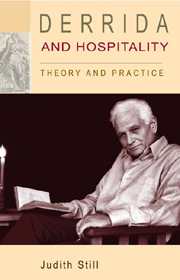Book contents
- Frontmatter
- Contents
- Acknowledgements
- Abbreviations
- 1 Introduction to the question of hospitality: ethics and politics
- 2 Patriarchs and their women, some inaugural intertexts of hospitality: the Odyssey, Abraham, Lot and the Levite of Ephraim
- 3 Friendship and sexual difference: hospitality from brotherhood to motherhood and beyond
- 4 Frenchalgeria – (not) asking for a name, naming, calling by name in tales of Algerians
- 5 The dangers of hospitality: the French state, cultural difference and gods
- 6 Animals and what is human
- 7 Concluding around hospitality
- Bibliography
- Index
6 - Animals and what is human
Published online by Cambridge University Press: 12 September 2012
- Frontmatter
- Contents
- Acknowledgements
- Abbreviations
- 1 Introduction to the question of hospitality: ethics and politics
- 2 Patriarchs and their women, some inaugural intertexts of hospitality: the Odyssey, Abraham, Lot and the Levite of Ephraim
- 3 Friendship and sexual difference: hospitality from brotherhood to motherhood and beyond
- 4 Frenchalgeria – (not) asking for a name, naming, calling by name in tales of Algerians
- 5 The dangers of hospitality: the French state, cultural difference and gods
- 6 Animals and what is human
- 7 Concluding around hospitality
- Bibliography
- Index
Summary
Let us say yes to who or what turns up, before any determination, before any anticipation, before any identification, whether or not it has to do with a foreigner, an immigrant, an invited guest, or an unexpected visitor, whether or not the new arrival is the citizen of another country, a human, animal, or divine creature, a living or dead thing, male or female. (OH, 77)
(Disons, oui, à l'arrivant, avant toute détermination, avant toute anticipation, avant toute identification, qu'il s'agisse ou non d'un étranger, d'un immigré, d'un invité, ou d'un visiteur inopiné, que l'arrivant soit ou non le citoyen d'un autre pays, un être humain, animal ou divin, un vivant ou un mort, masculin ou féminin. (DH, 73))
Why animals and hospitality?
In working on this book on hospitality, I have regularly come up against the question of the animal in Derrida, Cixous and Irigaray. This may seem on the face of it a contingent rather than necessary conjuncture. Why introduce animals into the question of hospitality (already a vast enough topic, to put it mildly)? And, from the other perspective, why would it be useful to the understanding of animality vis-à-vis humanity or animal–human relations to use the language of hospitality? Human–animal relations can be discussed very satisfactorily using the language of exploitation or opportunism or many other non-altruistic reference points – or, at the other extreme, say, the language of strange kinship.
- Type
- Chapter
- Information
- Derrida and HospitalityTheory and Practice, pp. 219 - 254Publisher: Edinburgh University PressPrint publication year: 2010



